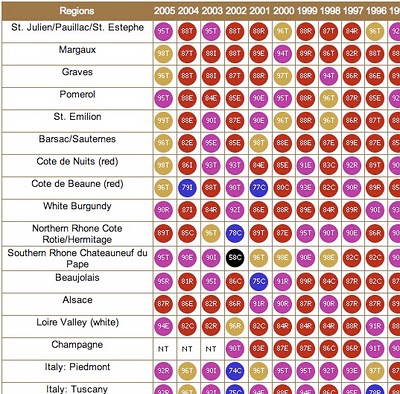Vinography Unboxed: Week of 2/8/26
9 hours ago





 One of the greatest mountains I have to climb is giving a brief explanation of what makes Chave so special. "Scoreboard!" Is neither respectful, nor accurate. I've bought or sold Chave practically my entire wine career. I've tasted the wines countless times. I've probably tasted every vintage for the last 20 years, not to mention a respectable smattering of 60's, 70's and 80's bottlings. Yet, even after all of these years, I am just now beginning to be able to articulate what makes these wines quite unlike anything else the world of wine has ever produced.
One of the greatest mountains I have to climb is giving a brief explanation of what makes Chave so special. "Scoreboard!" Is neither respectful, nor accurate. I've bought or sold Chave practically my entire wine career. I've tasted the wines countless times. I've probably tasted every vintage for the last 20 years, not to mention a respectable smattering of 60's, 70's and 80's bottlings. Yet, even after all of these years, I am just now beginning to be able to articulate what makes these wines quite unlike anything else the world of wine has ever produced.
 Once in a while, you come across a winery that is beyond comparison. A winery that sows their own path and is unique in every sense of the word. I've represented Wild Hog for a number of years. Each wine they make is singular. Specializing, but not limited to Pinot Noir, Zinfandel, Petite Sirah, and Italian Varietals. Each vintage is a completely unique experience.
Once in a while, you come across a winery that is beyond comparison. A winery that sows their own path and is unique in every sense of the word. I've represented Wild Hog for a number of years. Each wine they make is singular. Specializing, but not limited to Pinot Noir, Zinfandel, Petite Sirah, and Italian Varietals. Each vintage is a completely unique experience.
 Recently, I have participated in a couple of County Fairs as a wine judge. The entrants were all home winemakers, and about 80% of the wines were made from fruit other than grapes. Historically, I had scoffed at fruit wines. As wisdom (perhaps) has crept in, I've begun to philosophically understand the importance of these wines.
Recently, I have participated in a couple of County Fairs as a wine judge. The entrants were all home winemakers, and about 80% of the wines were made from fruit other than grapes. Historically, I had scoffed at fruit wines. As wisdom (perhaps) has crept in, I've begun to philosophically understand the importance of these wines. Spending time in Santa Barbara in the early 2000's, I was exposed to, but not intimate with Paso Robles. To me, at the time, the wines seemed to be good, not great, and certainly more rustic. I was exposed to endless overcooked Zins and Petite Sirahs, which tainted my initial impressions. Being that I am a devout Rhône-head, I was intrigued by some of the early proponents of these varieties such as Tablas Creek and l'Aventure. My interest was piqued by the possibilities.
Spending time in Santa Barbara in the early 2000's, I was exposed to, but not intimate with Paso Robles. To me, at the time, the wines seemed to be good, not great, and certainly more rustic. I was exposed to endless overcooked Zins and Petite Sirahs, which tainted my initial impressions. Being that I am a devout Rhône-head, I was intrigued by some of the early proponents of these varieties such as Tablas Creek and l'Aventure. My interest was piqued by the possibilities. Political talk radio, opinioned bloggers (ahem), sports talk, all are seemingly controversial, however, the reason for their existence is they make people feel better about themselves. As we form opinions, we lack confidence to make those opinions into conviction immediately. It takes time for these ideas and opinions to become part of our fabric. Pundits that say what we are thinking help us to become more confident in these fledgeling beliefs, until we feel that our opinions are fully affirmed. The rate of this transformation is more about our own self-confidence than the conviction of the person delivering the message.
Political talk radio, opinioned bloggers (ahem), sports talk, all are seemingly controversial, however, the reason for their existence is they make people feel better about themselves. As we form opinions, we lack confidence to make those opinions into conviction immediately. It takes time for these ideas and opinions to become part of our fabric. Pundits that say what we are thinking help us to become more confident in these fledgeling beliefs, until we feel that our opinions are fully affirmed. The rate of this transformation is more about our own self-confidence than the conviction of the person delivering the message. This crazy, mixed up world of wine we live in has a few governing principles. Of those, one of the most universal is that we're all a little damaged. That damage can be that we just don't fit into other business cultures due to genius, ADHD, or borderline personalities. That's what makes this so much fun, that we can connect to our fellow "damaged" people. If we are wine geeks, and indeed, you must be if you are reading this, we are inevitably geeks about other things. You can usually bet on the following mix of common interests in descending order of likelihood: Food, Music, Film, Art, Pop Culture, Liberal Politics, Environmental Issues, and Cars. Connecting to these people is one of the perks about this business, or as Cameron Crowe put it more eloquently: "The only true currency in this bankrupt world is what we share with someone else when we're uncool. " Lester Bangs-Almost Famous.
This crazy, mixed up world of wine we live in has a few governing principles. Of those, one of the most universal is that we're all a little damaged. That damage can be that we just don't fit into other business cultures due to genius, ADHD, or borderline personalities. That's what makes this so much fun, that we can connect to our fellow "damaged" people. If we are wine geeks, and indeed, you must be if you are reading this, we are inevitably geeks about other things. You can usually bet on the following mix of common interests in descending order of likelihood: Food, Music, Film, Art, Pop Culture, Liberal Politics, Environmental Issues, and Cars. Connecting to these people is one of the perks about this business, or as Cameron Crowe put it more eloquently: "The only true currency in this bankrupt world is what we share with someone else when we're uncool. " Lester Bangs-Almost Famous. Salespeople sell. Sales managers want salespeople to sell. It's in their DNA. Selling more wine can ultimately solve all problems. So why would anyone want to deal with "branding"? Simply put-the strength of your portfolio is often determined by how well your wines are branded. The success of many distributors is built by their branding efforts. Branding is the image and perception that you influence. Distributors have input into the packaging or language on the label, but the guerrilla branding is done by the distributor. The accounts you sell to, the way the wines are displayed. The waiters and clerks that sell to the end-user, and their training. This all helps or hurts your brands. Taking the time to execute this well is the most important thing a distributor can do for the long term health of a winery.
Salespeople sell. Sales managers want salespeople to sell. It's in their DNA. Selling more wine can ultimately solve all problems. So why would anyone want to deal with "branding"? Simply put-the strength of your portfolio is often determined by how well your wines are branded. The success of many distributors is built by their branding efforts. Branding is the image and perception that you influence. Distributors have input into the packaging or language on the label, but the guerrilla branding is done by the distributor. The accounts you sell to, the way the wines are displayed. The waiters and clerks that sell to the end-user, and their training. This all helps or hurts your brands. Taking the time to execute this well is the most important thing a distributor can do for the long term health of a winery. My all time favorite movie, "Say Anything" is full of inspiring, and hilarious moments, perhaps none more inspiring than the following:
My all time favorite movie, "Say Anything" is full of inspiring, and hilarious moments, perhaps none more inspiring than the following: Steve Jobs is evil. Steve Jobs is brilliant. Steve Jobs is megalomaniac. Sick of hearing about Steve Jobs? Me too. However, he is the shining example of "user experience" for consumer products. Apples feel and act differently. The sounds they make, the package they come in, the store you walk into, the support you receive. He has defined exactly what your experience will be in regards to his sacred fruit, and for that, he is a genius. We need to approach wine in the exact. same. way.
Steve Jobs is evil. Steve Jobs is brilliant. Steve Jobs is megalomaniac. Sick of hearing about Steve Jobs? Me too. However, he is the shining example of "user experience" for consumer products. Apples feel and act differently. The sounds they make, the package they come in, the store you walk into, the support you receive. He has defined exactly what your experience will be in regards to his sacred fruit, and for that, he is a genius. We need to approach wine in the exact. same. way. Ever walk into a retailer and have them extoll tales of the double secret declassified grapes that Cult Napa producer basically gave away? It's one of the most cliched scenarios, retailers make bank off this idea, and the reality is, you're getting duped. It's not necessarily the retailer that's doing the duping though. It could be the producer, it could be the distributor. No matter, the truth is, you just cant get Screaming Eagle for $30.
Ever walk into a retailer and have them extoll tales of the double secret declassified grapes that Cult Napa producer basically gave away? It's one of the most cliched scenarios, retailers make bank off this idea, and the reality is, you're getting duped. It's not necessarily the retailer that's doing the duping though. It could be the producer, it could be the distributor. No matter, the truth is, you just cant get Screaming Eagle for $30. I'm so sick of hearing about your social media, blah, blah blah. We're all on Facebook now, and frankly, many of us have moved on after the awkward reconnection with high school friends we barely remember. What are you supposed to do with Facebook if you don't do farmville? Twittter? Yeah, I do that to, but keeping up with all of the goings on over there can be somewhere between counterproductive and obsessive. For those of you that have found the balance for twitter in your lives, including my brothers (@endcycle, @bradmahler), you are more man than I (or perhaps just less neurotic). And LinkedIn, well, that's just really no fun. Apparently, you're not supposed to have a sense of humor and be in business.
I'm so sick of hearing about your social media, blah, blah blah. We're all on Facebook now, and frankly, many of us have moved on after the awkward reconnection with high school friends we barely remember. What are you supposed to do with Facebook if you don't do farmville? Twittter? Yeah, I do that to, but keeping up with all of the goings on over there can be somewhere between counterproductive and obsessive. For those of you that have found the balance for twitter in your lives, including my brothers (@endcycle, @bradmahler), you are more man than I (or perhaps just less neurotic). And LinkedIn, well, that's just really no fun. Apparently, you're not supposed to have a sense of humor and be in business.